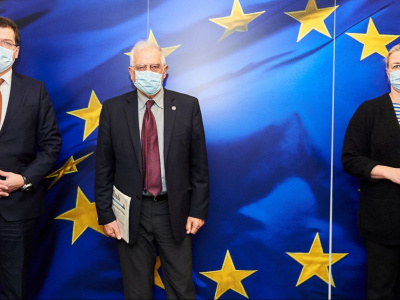
Intercultural integration and communication: An agenda for Europe
As the EU is about to adopt a strategy on culture in external relations and a Global strategy on foreign and security policy, we argue that both documents would be stronger with the explicit mention of intercultural communication as key vehicle to (re)build trust with the world.
How do Europeans manage to communicate in a context of cultural differences at home and in their foreign and development policies?
This question was at the heart of the public event I organised on behalf of ECDPM last December with BOZAR, Pro-Intercultura, External Cultural Relations/More Europe and EUNIC Global. Coincidentally the event, a continuation of the “Preparatory Action for Culture in EU External Action”, took place a few weeks after the Paris terror attacks and the Brussels lockdown, a time when Europeans were reflecting on domestic models of integration of different cultures and religions.
Hosted by a professional trainer and facilitator in intercultural relations, Margaux Richet, four personalities took part in this intercultural dialogue: a writer, Rachida Lamrabet, a global policy maker, Pascal Lamy, a European Commission representative, Androulla Kaminara, a leading academic on intercultural communication, Milton Bennett. The answers were both sobering and stimulating.
Intercultural contacts are not enough
In an age of migration fluxes, raging conflicts and rampant populism, managing relations with those whom we think “are not like us” is paramount. Cultural differences between people tend to increase and there is no sign that values will converge towards a global cultural citizenship, said the main speaker, Milton Bennett.
Bennett further argued that Europeans have to do better in dealing with “otherness”. Erasmus and Erasmus + exchange programmes help reduce prejudices, but these do not change the power relations among cultures. Intercultural contact is not enough, he said.
Recognising cultural domination and asymmetries
Pascal Lamy reminded us that there are strong “power asymmetries in mutual cultural knowledge” and Europeans know less about others than the other way around. As the report of the EU Preparatory Action on culture in external relations advised, Europe and the EU should engage with the world in a spirit of mutual listening, learning and sharing.
Intercultural communication also matters for international political achievements. Policy makers tend to talk over each other, rather than with each other, in global governance systems due to the lack of intercultural exchange.
Power asymmetries are also at the core of Rachida Lamrabet’s experience of cultural diversity in Europe. Because the concept of cultural tolerance is based on social hierarchies and the idea of cultural superiority, it reinforces asymmetries and is potentially dangerous. “A tolerant dominant majority can become less tolerant” depending on political, social, economic trends and events, she argued.
Developing a European self-reflexive consciousness
Participants agreed that Europeans need to make more of an effort to know not only other cultures better, but also to spot their own implicit biases due to their own cultures. Managing cultural and power asymmetries is achieved by developing self-reflexive critical consciousness.
Mastering our own understanding of situational and cultural differences and gaps between us and others is only possible with critical consciousness. This requires being in a mutual listening and learning mode.
This is not new, but it is certainly becoming more acute in a postcolonial age, and at a crucial time when the EU is preparing its Global Strategy on Foreign and Security Policy and its strategy on external cultural relations. The success of both strategies will strongly depend on the ability of Europeans to communicate with the world in a self-reflexive manner and move towards a mutual creation of meaning. It will also require moving away from the denial of cultural differences and towards conscious mutual adaptation and integration.
European governments and EU institutions will need to invest more in skills for intercultural relations and in understanding their implications for “Europeans”, both as members of European societies and as a distinctive cultural group in the world.
European Commission representative Androulla Kaminara observed that understanding the context and culture, and being able to communication in a culturally sensitive manner with partners, is key for development practitioners.
Towards a laboratory for intercultural communications
Developing cultural awareness and critical consciousness inside one’s own organisation takes time and investment. As Rachida Lamrabet said “reading literature is a way of putting ourselves in the lives of others”. Staff training, in particular for political dialogue, is a way of building capacities and providing the right incentives to understand and adopt an intercultural mindset.
But the EU doesn’t need to start from scratch. There are intercultural experiences and expertise from internal programmes – like ERASMUS, Youth in Action, and SALTO – that can be a source of learning for those working on external relations. It is necessary to capitalise on experiences, through research and knowledge circulation, in the EU and abroad. Working with “champions” or “European cultural ambassadors” that have intercultural skills is also a possible path towards a new type of European engagement with others.
Bringing artists, policy makers and scientists together – as done in BOZAR last December – is clearly a useful way to co-create common meaning and provoke a frank discussion on biases and perceptions that can help Europeans communicate in a context of cultural differences at home and in their foreign and development policies.
The views expressed here are those of the author and not necessarily those of ECDPM.

